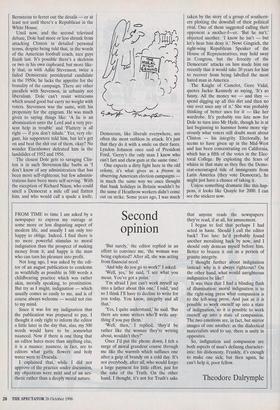Second opinion
FROM TIME to time I am asked by a newspaper to express my outrage at some more or less disgusting aspect of modern life, and usually I am only too happy to oblige. Indeed, I find there is no more powerful stimulus to moral indignation than the prospect of making money from it; and happy is the man who can turn his pleasure into profit.
Not long ago, I was asked by the edi- tor of an august publication to condemn as wrathfully as possible in 500 words a childbearing practice which was rather akin, morally speaking, to prostitution. But try as I might, indignation — which usually comes so easily to me, and is of course always welcome — would not rise to my mind.
Since it was for my indignation that the publication was prepared to pay, I thought it only right to inform the editor a little later in the day that, alas, my 500 words would have to be somewhat nuanced. Now if there is one thing that an editor hates more than anything else, it is a nuance: nuances, in fact, are to editors what garlic flowers and holy water were to Dracula.
I explained that, while I did not approve of the practice under discussion, my objections were mild and of an aes- thetic rather than a deeply moral nature. `But surely,' the editor replied in an effort to convince me, 'the woman was being exploited? After all, she was acting from financial need.'
`And why do you go to work?' I asked. `Well, yes,' he said, 'I see what you mean. You've got a point.'
`I'm afraid I just can't work myself up into a lather about this one,' I said, 'and so I think I'll have to decline to write for you today. You know, integrity and all that.'
`Yes, I quite understand,' he said, 'But there are some writers who'll write any- thing if you pay them.'
`Well, then,' I replied, 'they'd be rather like the woman they're writing about, wouldn't they?'
Once I'd put the phone down, I felt a surge of moral grandeur course through me like the warmth which suffuses one after a gulp of brandy on a cold day. It's not everybody, after all, who would forgo a large payment for little effort, just for the sake of the Truth. On the other hand, I thought, it's not for Truth's sake that anyone reads the newspapers: they're read, if at all, for amusement.
I began to feel that perhaps I had acted in haste. Should I call the editor back? Too late: he'd probably found another moralising hack by now, and I should only demean myself before him. Better to brazen it out as a person of granite integrity.
I thought further about indignation instead: why is it always righteous? On the other hand, what would unrighteous indignation be like?
It was then that I had a blinding flash of illumination: moral indignation is to the right-wing press what compassion is to the left-wing press. And just as it is possible to work oneself up into a state of indignation, so it is possible to work oneself up into a state of compassion. The two emotions are, in fact, but mirror images of one another: as the dialectical materialists used to say, there is unity in opposites.
So, indignation and compassion are both aspects of man's defining character- istic: his dishonesty. Frankly, it's enough to make one sick; but then again, he can't help it, poor fellow.
Theodore Dalrymple


















































































 Previous page
Previous page